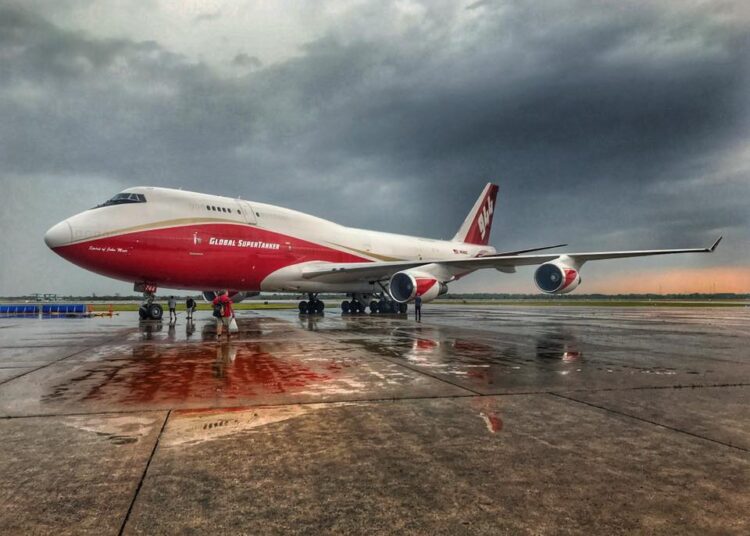COLORADO SPRINGS, Colo.--(BUSINESS WIRE)--Global SuperTanker Services, LLC (“GSTS”) today released a two-part, independent analysis of aerial firefighting effectiveness and the economic impact of U.S. wildfires conducted by George Mason University (“GMU”) policy experts Dr. Stephen Fuller and Dr. Keith Waters.
SuperTanker is the world’s largest firefighting air tanker and provides firefighters with a range of unique capabilities. In late 2019, GSTS completed successful missions fighting the Kincade fire in Northern California, and fires in South America threatening the Amazon rainforest for the Bolivian government.
The GMU analysis relied exclusively on data provided by U.S. Forest Service (“USFS”), and concluded that deployment of air tankers early in the life of wildfires dramatically reduces fire duration, which directly correlates to economic impact and cost to American taxpayers. The study concluded, for example, that among more than 11,000 fires in which larger air tankers were deployed, fires burned on average for less than one day when tankers were deployed in the first 4-6 hours of a reported fire. Fires in which tankers were deployed after 72 hours burned on average for more than 20 days.

The second GMU analysis utilized U.S. Department of Commerce data on the economic impact of wildfires and concluded that quantifiable annual costs total a minimum of $185 billion annually. The analysis further noted the broad economic impact of wildfires results in a minimum of $31 billion annually in unrealized federal tax revenues. These figures do not account for direct costs paid, for example, in insurance claims, repairs to infrastructure, etc.
The Fuller-Waters study analyzed over 330,000 lines of USFS fire incident data from 2014-2018 related to the deployment of LATs and VLATs. The study’s methodology was based on established U.S. government doctrine that “a vigorous initial response to a wildfire, a process referred to as initial attack, can greatly reduce the likelihood of the fire becoming larger and causing substantial damage,” (Link: USDA Aviation Plan).
And, “air tankers deliver fire retardant to wildfires, thereby reducing fire intensity and rate of spread, allowing ground firefighters time to contain and/or control new, emerging and large fires,” (Link: USDA Large Air Tanker Ops Plan).
The volume of U.S. wildfires now exceeds 70,000 per year. Factors such as global warming, land management practices creating dangerous increases in wildfire “fuel” such as high-combustion vegetation, and recent threats of terrorists weaponizing wildfires have led to repeated warnings to consider whether America’s aerial fire containment strategy has kept pace with the threat. At present, the U.S. Forest Service has only 13 larger air tankers under contract and guaranteed to respond quickly.

“Global SuperTanker is the world’s largest firefighting air tanker, but is by no means a silver bullet solution to a greatly under-resourced U.S. aerial firefighting fleet,” said Dan Reese, president of GSTS. “However, we believe this study is a significant milestone in defining solutions to America’s escalating wildfire threat. For the first time, definitive information correlating air tanker use, wildfire dynamics and economic impacts is available to policymakers worldwide to inform aerial firefighting strategies.”
"Forecasts of severe 2020-2025 fire seasons in the U.S., and escalating threats of wildfire threats globally as witnessed in Australia recently are signals that we must as a nation proactively address," said Roger Miller, chairman of GSTS, and partner with Alterna Capital Partners, the investment manager for the fund that owns and operates GSTS. "Alterna together with GSTS is exploring strategic alternatives to ensure SuperTanker's continued viability as the world's largest and most cost efficient very large air tanker, which include enhancements to the current product offering and the invitation for strategic investors to evaluate partnering with GSTS and Alterna to roll out incremental product offerings to meet the evident demand.”






